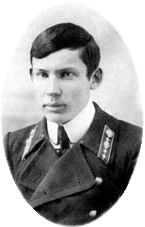Alexander Volkov (writer) facts for kids
Quick facts for kids
Alexander Volkov
|
|
|---|---|

Russian writer Alexander Melentyevich Volkov, 1914
|
|
| Born | Alexander Melentyevich Volkov June 14, 1891 Ust-Kamenogorsk, Semipalatinsk Oblast, Russian Empire |
| Died | July 3, 1977 (aged 86) Moscow, Soviet Union |
Alexander Melentyevich Volkov (Russian: Александр Мелентьевич Волков June 14, 1891 – July 3, 1977) was a Soviet writer. He wrote many novels, short stories, plays, and poems, especially for children. He is best known for his "Magic Land" series of books. These stories are based on The Wonderful Wizard of Oz by L. Frank Baum.
Contents
About Alexander Volkov
His Early Life and Education
Alexander Volkov was born in Ust-Kamenogorsk, which was part of the Russian Empire (now called Oskemen in Kazakhstan). He was a very bright student. At just 12 years old, he finished school as the top student. Later, he even started teaching there.
In 1907, he went to the Tomsk Teachers Institute. He graduated in 1909. This allowed him to teach almost all subjects in school.
His Career as a Teacher and Professor
Volkov started his career as a teacher in his hometown. Later, he taught math in a village called Kolyvan. In the 1920s, he moved to Yaroslavl and became a school principal. He also studied math by himself and earned a degree from the Yaroslavl Pedagogical Institute.
In 1929, he moved to Moscow. There, he became a head teacher at a special school for adult workers. He quickly finished a university course in physics and math at Moscow State University. From 1931, he taught advanced math at the Moscow Institute of Non-Ferrous Metals and Gold.
His Famous Books
The Magic Land Series
Alexander Volkov is most famous for his "Magic Land" books. The first book, The Wizard of the Emerald City, came out in 1939. It was a retelling of L. Frank Baum's The Wonderful Wizard of Oz. Volkov changed some things in his version. For example, Dorothy became "Ellie," and Oz was called "Magic Land". Also, Toto could talk when he was in Magic Land!
Volkov's book became very popular in the Soviet Union. So, in the 1960s, he started writing his own new adventures for the series. He sometimes took ideas from Baum's other Oz books, like the "Powder of Life." But mostly, he created his own unique world and stories. He published four more books between 1963 and 1970. The sixth and final book was published after he passed away in 1982.
What Makes His Books Special?
Volkov's "Magic Land" books are different from Baum's in some ways. The characters often face big choices about how to help people. The heroes frequently have to protect Magic Land from invaders. They also help people who are not free by changing unfair governments. These ideas were common in Soviet adventure stories.
Volkov believed that human inventions could solve many problems. So, in his books, the heroes often use cool gadgets and machines instead of just magic. For example, they might use a special cannon or a super-robot to win battles.
Popularity Around the World
Volkov's "Magic Land" series was translated into many languages. It was very popular with children in countries like East Germany, China, and Arab countries such as Syria. In some of these places, Volkov's version of the story is even better known than Baum's original Oz books!
His "Magic Land" books have also been translated into English.
Volkov's Magic Land Books
- The Wizard of the Emerald City (Волшебник Изумрудного города, 1939)
- Urfin Joos and his Wooden Soldiers (Урфин Джюс и его деревянные солдаты, 1963)
- The Seven Underground Kings (Семь подземных королей, 1964)
- The Fiery God of the Marrans (Огненный бог марранов, 1968)
- The Yellow Fog (Жёлтый туман, 1970)
- The Secret of the Deserted Castle (Тайна заброшенного замка, 1975, published in 1982)
Other Books by Volkov
Besides the "Magic Land" series, Alexander Volkov wrote many other books:
- Wonderful balloon (The first aeronaut) (1940)
- The Two Brothers (1950, rewritten in 1961)
- The Architects (1954)
- Astern trace (1960)
- The Wandering (1963) (This book is about the childhood and youth of Giordano Bruno, a famous philosopher.)
- Prisoner of Zargrad (1969)
- Land and Sky (1972)
 | DeHart Hubbard |
 | Wilma Rudolph |
 | Jesse Owens |
 | Jackie Joyner-Kersee |
 | Major Taylor |

